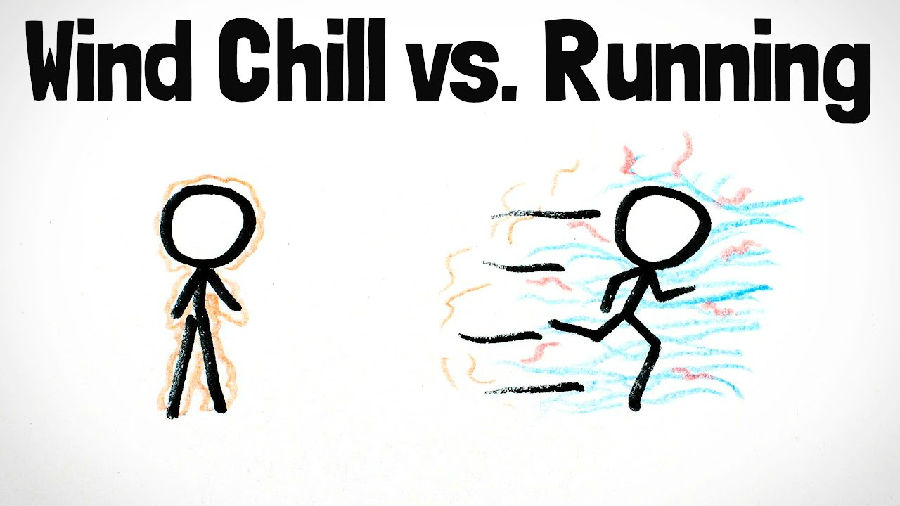When it's cold out and you didn't dress for the weather and you're far from shelter,
当外面很冷,你没有穿合适的衣服,你离家又远,
you have a crucial decision to make: should you run (or ski) to try to warm up, or go slow and avoid the cooling effects of wind?
你需要做一个关键的决策:你应该跑步(或滑雪)来热身,还是放慢速度以避免风的冷却作用?
When it's cold out and you're not moving, the heat you lose goes to heating up the air around you,
当外面很冷,你不动的时候,你失去的热量会加热你周围的空气,
forming a slightly warmer protective layer so you don't cool off as quickly.
形成一个稍微暖和一点的保护层,这样你就不会很快冷下来。
But if you're moving (or if it's windy), you're being exposed to some amount of fresh, new, cold air – more of it the faster you go.
但是如果你动起来(或者迎风走),你就会接触到一些新鲜且寒冷的空气——你走得越快,接触到的空气就越多。
You're literally running away from the air you warmed and so you cool off faster than if you stayed put.
你实际上是在逃离你加热的空气,所以你比呆在原地冷得更快。
Though once you're going fast enough, the protective layer of air will be pretty much entirely gone
尽管一旦你跑得足够快,空气的保护层就会完全消失,
and you'll basically lose heat at the same rate regardless of how fast you're running.
不管你跑得多快,你基本上都会以相同的速度散失热量。
Now, when humans run, we also generate a fair amount of heat inside our bodies.
当我们在跑步时,我们体内也会产生相当数量的热量。
In fact, we produce a roughly constant amount of heat per kilometer traveled,
事实上,我们每走一公里产生的热量大致是恒定的,
so the faster you go, the more heat you generate any given minute.
所以速度越快,每分钟产生的热量就越多。
Because the heat generated by running has a steady increase, while your protective layer of warm air goes away quickly at low speeds,
因为跑步产生的热量有一个稳定的增加,而暖空气的保护层会在低速下迅速消失,

it turns out that there's a kind of 'forbidden range' of speeds where it's not worth walking,
事实证明,这是一种不值得步行或慢跑的速度“禁区”
or even running slowly, since you'd lose less heat standing still.
因为你站着不动会损失更少的热量。
So what's the minimum speed where the heat you generate running finally balances out the additional heat you lose due to air movement?
那么当你跑步时产生的热量最终抵消了由于空气运动而损失的额外热量时,你的最小速度是多少?
Well, using some estimations for the surface area and energy generation of an adult human running naked
使用一些对裸替成人跑步时产生热量及表面积的估算
and the effects of wind on heat loss, I found that when it's freezing outside,
以及风对热损失的影响,我发现当外边很冷时,
you need to be able to run roughly a 5 minute mile to be better off moving than staying put. And faster, if it's colder out.
你需要能够大约5分钟跑完英里,移动的优势才能胜过原地不动。越冷,速度就要越快。
And this wouldn't even mean you're not losing heat – it's just the point at which you lose less heat running than you do standing still.
这甚至不意味着你没有损失热量——只是你在跑步时损失的热量比你在原地不动时少。
Now if that sounds like a challenge, don't worry.
如果这听起来很具挑战性,但别担心。
All you need to do is put on some clothing – like, enough that you're only losing half as much heat as a naked person –
你所需要的是穿上一些衣服——比如,你只损失了一个裸体人一半的热量——
and a 15 minute mile (basically a brisk walk), will do just fine.
以及15分钟跑完一英里(基本上是快步走),这样就行了。
So, either stay put, or wear appropriate winter clothing, or run naked very very fast through the snow.
所以,要么呆在原地,要么穿合适的冬衣,或者在雪地里疯狂裸奔。











